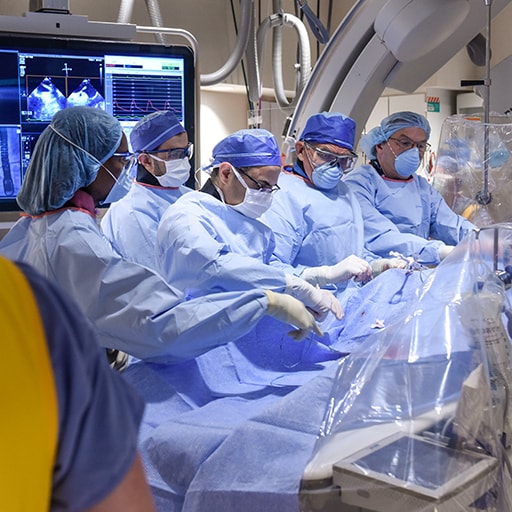Your pre-visit guide for seeing a Cardiologist near me
Your pre-visit guide for seeing a Cardiologist near me
Blog Article
Recognizing the Importance of Cardiology in Modern Healthcare Services
Cardiology plays a vital function in contemporary health care, especially as heart problem proceeds to be the leading root cause of death worldwide. Developments in diagnostics and therapy have transformed client care, enabling earlier interventions and improved end results. In addition, the change in the direction of precautionary cardiology equips individuals to manage their health proactively. As innovation remains to evolve, the integration of cutting-edge options may even more redefine cardiology's impact on public wellness, triggering a better examination of arising patterns and their implications.
The Frequency of Cardiovascular Disease and Its Influence On Public Health
Heart disease continues to be the leading cause of fatality worldwide, its impact prolongs far past individual clients to affect public health and wellness systems and economies. The high frequency of heart problem positions a considerable pressure on health care sources, necessitating raised funding for treatment, recovery, and avoidance programs. Public health efforts have to deal with threat factors such as weight problems, smoking cigarettes, and sedentary way of lives, which add significantly to the rising incidence of heart conditions.Moreover, the economic concern associated with heart condition is immense, including not just straight clinical costs however likewise indirect expenditures associated with lost efficiency and early death. Areas face challenges in handling these expenses, usually leading to disparities in health care gain access to and end results. As the populace ages and lifestyle-related dangers remain to intensify, the seriousness for efficient cardiology treatments ends up being extremely important. Addressing heart disease is not just an issue of specific wellness however likewise a vital public health and wellness priority.
Advances in Cardiac Diagnostics and Imaging Techniques
Current improvements in heart diagnostics and imaging methods have changed the area of cardiology, improving the capability to discover and keep track of heart problem. Strategies such as cardiac MRI, CT angiography, and echocardiography have come to be progressively advanced, providing thorough photos of cardiac frameworks and functions. These modalities permit the early identification of problems like coronary artery disease, heart failing, and valvular disorders.Moreover, improvements in non-invasive diagnostics, such as wearable technology and remote surveillance gadgets, have equipped clients and medical care suppliers. These tools promote real-time tracking of heart rhythms and various other vital signs, causing timely interventions. Additionally, synthetic intelligence is being incorporated into imaging evaluation, boosting accuracy and performance in diagnosis.
Advancements in Treatment Choices for Heart Issues
Recent innovations in cardiology have caused significant developments in therapy options for heart problems. These consist of advanced surgical strategies that enhance procedural end results and emerging medicines that use brand-new avenues for treatment. As the area evolves, these advancements play an essential role in enhancing person treatment and end results.
Advanced Surgical Techniques
Innovations in medical strategies have transformed the landscape of cardiology, offering brand-new expect patients with heart conditions. Minimally intrusive procedures, such as catheter-based interventions, have actually substantially reduced recovery times and medical facility remains. Methods like robotic-assisted surgical procedure enhance precision, allowing cosmetic surgeons to browse complicated physiological frameworks with better precision. Advancements in imaging technology facilitate real-time visualization during procedures, boosting end results. Transcatheter aortic shutoff substitute (TAVR) exemplifies an innovation in treating aortic constriction, making it possible for valve substitute without open-heart surgery. Additionally, hybrid methods that integrate catheter-based and surgical methods offer tailored remedies for numerous heart problems. These advanced medical strategies not only enhance patient safety and security however likewise expand therapy choices, underscoring the crucial duty of technology in contemporary cardiology practices.
Arising Treatments and medicines
As the landscape of cardiology proceeds to progress, emerging drugs and treatments play a critical duty in improving treatment choices for heart conditions. Technologies such as novel anticoagulants and progressed lipid-lowering agents have actually transformed the management of cardiovascular illness, greatly decreasing person morbidity and mortality. In addition, the advancement of gene therapies and regenerative medicine uses encouraging opportunities for dealing with problems formerly regarded permanent. Medical trials are constantly disclosing the efficacy of these therapies, pushing the borders of conventional therapies. The assimilation of electronic health innovations facilitates tailored medicine, allowing for tailored treatment strategies based on genetic and way of life elements. Jointly, these improvements underscore the vibrant nature of cardiology, improving patient outcomes and redefining criteria of care in modern-day healthcare.
The Function of Preventive Cardiology in Person Care
Preventative cardiology plays a vital duty in client treatment by concentrating on the identification of threat variables that contribute to heart condition. With way of life alteration approaches and very early discovery strategies, doctor can effectively reduce the incidence of cardiovascular events - Cardiology care. This positive method not only enhances individual results but additionally advertises long-term health
Threat Element Recognition
While cardiovascular conditions stay a leading source of morbidity and death worldwide, reliable danger factor recognition offers as a cornerstone of precautionary cardiology. Determining risk variables such as high blood pressure, family, hyperlipidemia, and diabetes mellitus history is crucial for early intervention. Medical care experts make use of different evaluating methods to evaluate these variables, enabling tailored preventative steps. Additionally, comprehending a person's way of life selections, such as smoking cigarettes and physical lack of exercise, further informs danger evaluations. This complete analysis enables clinicians to establish personalized care plans focused on mitigating risks. By prioritizing threat element identification, health care systems can boost patient outcomes and minimize the overall concern of heart diseases, ultimately contributing to enhanced public health strategies and resource allotment.
Way Of Life Adjustment Methods
A wide variety of research studies highlights the vital duty of way of life modification methods in lowering cardiovascular illness risk. These methods encompass dietary changes, raised physical activity, smoking cessation, and weight administration. By taking on a heart-healthy diet regimen rich in fruits, vegetables, whole grains, and lean proteins, people can lower cholesterol levels and blood pressure. Normal exercise enhances the heart and improves total cardio health. In addition, giving up cigarette smoking substantially lowers the threat of cardiovascular disease and improves healing rates for those with current conditions. Weight monitoring further adds to cardiovascular health by minimizing various other threat factors such as diabetes and hypertension. Carrying out these way of life alters not only promotes individual health but likewise serves as a keystone of preventative cardiology in person care.
Early Detection Strategies
Way of living alterations considerably add to decreasing cardio illness threats, yet they are most effective when coupled with very early discovery techniques. Preventative cardiology stresses the relevance of determining potential heart concerns before they escalate into major conditions. Strategies such as blood pressure tracking, cholesterol screening, and advanced imaging modern technologies like echocardiograms play important functions in reviewing cardio health. Biomarkers and genetic testing also boost the precision of very early discovery, permitting tailored preventive methods. Regular cardiac threat examinations empower medical care suppliers to interfere proactively, possibly protecting against cardiovascular disease and strokes (Cardiology Jupiter). By incorporating these early discovery approaches right into regular care, clients can benefit from prompt way of life treatments and targeted therapies, eventually enhancing and improving outcomes high quality of life
Integrating Innovation Into Cardiology Practices
As improvements in modern technology proceed to improve numerous fields, the assimilation of ingenious tools and systems right into cardiology methods has actually ended up being important for boosting patient treatment and outcomes. these details Telemedicine platforms allow cardiologists to keep track of patients remotely, enhancing accessibility to care while decreasing the worry on medical care centers. Wearable tools, such as smartwatches, make it possible for constant heart price tracking, notifying both doctors and clients to potential problems in real-time. Furthermore, fabricated knowledge (AI) is being used to examine vast amounts of cardiac information, aiding in very early medical diagnosis and customized therapy strategies. Advanced imaging strategies, including 3D echocardiography, enhance visualization of heart structures, resulting in a lot more specific treatments. Digital health and wellness records (EHRs) enhance person details management, making certain that cardiologists have instant accessibility to essential information. With each other, these technical developments are changing cardiology, promoting positive management and boosted health and wellness results for clients with cardiovascular conditions.
The Significance of Client Education And Learning and Engagement
Individual education and interaction play a pivotal duty in the management of cardio health and wellness. By furnishing clients with expertise about their conditions, therapy alternatives, and way of life changes, doctor empower individuals to take an active duty in their treatment. This proactive technique can bring about improved adherence to recommended medicines, nutritional adjustments, and exercise regimens, eventually lowering the risk of complications.Engagement also fosters a strong patient-provider connection, urging open interaction and trust fund. When patients feel informed and included, they are more probable to voice problems and ask inquiries, which can bring about better clinical outcomes. Additionally, educational resources, such as workshops or digital platforms, can enhance understanding and promote self-management strategies. In general, prioritizing patient education and engagement is important for enhancing cardiovascular health, enhancing high quality of life, and minimizing health care expenses related to cardiovascular diseases.
Future Fads in Cardiology and Their Possible Effect

Frequently Asked Inquiries
What Way Of Living Modifications Can Decrease Cardiovascular Disease Threat?
The present inquiry addresses lifestyle adjustments that can considerably reduce cardiovascular disease danger. Dr Garcia. Adopting a well balanced diet plan, participating in regular physical task, keeping a healthy weight, managing stress and anxiety, and avoiding tobacco can notably enhance cardiovascular wellness
Exactly How Can I Recognize Early Signs of Heart Issues?
Identifying early signs of heart problems includes surveillance signs such as chest discomfort, shortness of breath, fatigue, and irregular heartbeat. Timely awareness of these signs can trigger essential clinical evaluation and intervention for far better outcomes.
What Are the Distinctions Between Cardiologists and Heart Surgeons?
The distinctions between cardiologists and cardiac doctors depend on their duties; cardiologists mostly handle and detect heart conditions with non-invasive approaches, while heart surgeons perform procedures to deal with structural heart problems. Each plays a crucial, distinctive role.

Just how Usually Should I Obtain My Heart Health And Wellness Checked?
The frequency of heart checkup differs based on individual threat aspects. Typically, grownups need to undertake assessments every one to 2 site web years, while those with status quo may require even more frequent analyses as encouraged by healthcare professionals.
What Function Does Genetics Play in Cardiovascular Disease Threat?
Genes significantly influences heart illness risk, with domestic patterns indicating inherited problems. Certain genes can predispose people to hypertension, cholesterol concerns, and other cardio problems, highlighting the relevance of genetic testing in evaluating heart health and wellness. Heart disease stays the leading reason of death around the world, its impact prolongs much beyond specific patients to impact public wellness systems and economies. Public health and wellness campaigns should attend to risk elements such as excessive weight, smoking, and inactive way of livings, which add significantly to the increasing occurrence of heart conditions.Moreover, the financial concern connected with heart condition is tremendous, encompassing not only straight clinical prices but also indirect costs associated to shed performance and early mortality. Preventive cardiology plays a necessary duty in patient care by focusing on the identification of risk factors that contribute to heart disease. Man-made intelligence (AI) and machine knowing are improving diagnostics and individual tracking, allowing very early discovery of heart illness. The distinctions in between cardiologists and cardiac specialists exist in their duties; cardiologists largely take care of and detect heart problems with non-invasive techniques, while cardiac cosmetic surgeons carry out surgical procedures to deal with architectural heart concerns.
Report this page